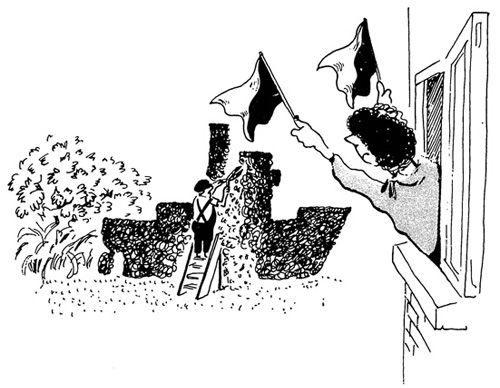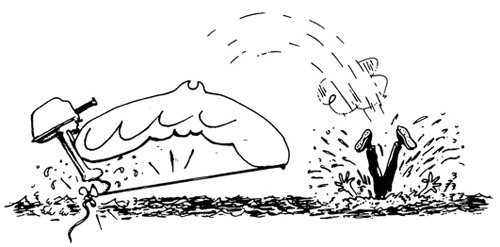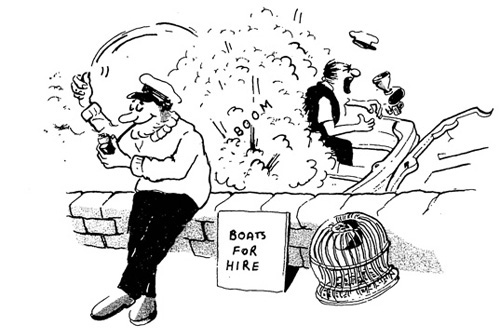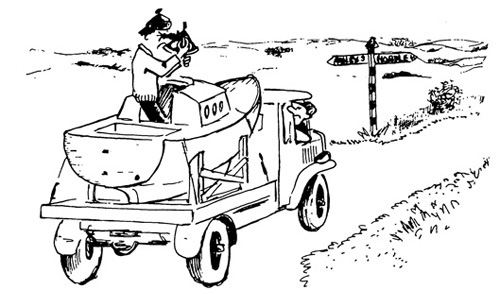Salty Dog Talk (2 page)
Authors: Bill Beavis

Turning a blind eye stems from the famous incident during the Battle of Copenhagen when Admiral Nelson, as second in command, complained he could not see the flag signal from his superior which ordered him to break off the bombardment. He had deliberately placed the telescope to his blind eye, and proceeded to ignore the order, with glorious results.

’Tween the devil and the deep blue sea
These words were first spoken by Commodore Josiah Tattnall, USN to justify the intervention in the British attack in 1859 on the Peiho forts, during the China Wars. He towed boatloads of survivors from the shore with his ship
USS Toegwan
. A southern-born officer, he might well have used the words later in his career when he quit the United States Navy and joined the Confederacy.
Lower deck name for what was officially termed Bounty Money – monies paid to crews for sinking an enemy vessel.
Blood money
was however the more honest appellation since the amounts were reckoned not on the size or importance of the enemy ship but rather on the numbers of crew slaughtered. At one time this was as high as five guineas for every man killed.
Comes from the days (before August 1970) when rum was issued daily to crews in the Royal Navy. Instead of drinking their tot at the time of issue as the rule required some men would spit their tot into a bottle and when the bottle was full drink it in one wild session.
Braces
were the names given to the ropes which controlled the yards from which the sails were hung. Yards and sails were said to be
braced
up when they were tensioned hard against the wind. A nice comparison with someone puffing out their chest and ready for anything. Sometimes used as an order meaning get organised, stop messing about, etc.
From the practice of stopping a ship by letting go the anchor. Used only in emergencies (or by accident), it has the most dramatic effect. As the anchor bites so the ship shudders to a standstill accompanied by a cloud of chain chippings and dust, tremendous noise and the whipping and clanging of masts and rigging.
Another way to bring a vessel up short was to fire
a shot across its bows
. This was done as a warning. If the vessel failed to stop the next shot was trained upon her. This saying too has come ashore.

Blind eye
Originally a name for the purveyors of dried meat called
boucan
which was eaten throughout the Caribbean. The word was extended to include the French settlers who hunted the meat and later to the English and Dutch who in their turn hunted the French settlers. Soon the word came to mean any lawless adventurer. It became popularised throughout the English language in 1684 after the publication of John Esquemeling’s book
Bucaniers of America
. Esquemeling, a French doctor, was for a short period a buccaneer.
Although a military tactic since Roman times when it was meant to instill a backs-to-the-wall spirit, the most quoted case concerns the Spanish conquistador Herman Cortez who, having reached the shores of Mexico, and salvation so far as his men were concerned, found them in no mood to go traipsing off into the Yucatan jungle. To drive home the purpose of their mission he had the ship’s boats drawn up on the beach and burnt. Then, with no alternative but to move forward, the conquest of central America could begin. Hundreds of years later during the Battle of the Falkland Islands in World War I, ships of the British squadron running short of coal used wooden boats to fire their boilers. This gave the saying a slightly different angle.
The sailor’s way of describing a passage which included bad days of headwinds when the vessel would have to be sailed
by
the wind, and good days when the
large
or square sails could be used giving more comfort and a better speed. (Sailing ‘large’ was to sail with the wind abaft the beam.)

Brought up all standing
From a method of navigation whereby the skipper relies on experience, intuitiveness, memory and implicit faith. Fishing boats in particular were said to find their way around by guess and by God.
A reference to the wooden boards which made up the ship’s deck; ‘by the board’ meant literally to throw over the side, or figuratively to let something pass. Board is a word which now occurs in a variety of meanings; we go
overboard
for something exciting, we
take aboard
or comprehend. In a literal sense, and showing how the meaning has progressed, astronauts climb
aboard
their rocket ship though there isn’t so much as a splinter of wood to be seen.
Canvas
Derived from the Greek
Kannabis
which although popularly understood as a stimulating narcotic is in fact plain old-fashioned hemp. In the early days sails were woven from hemp and that is where the word canvas comes in. Even today a boat’s sails are called her canvas, though the material itself might be anything from polyester to toughened paper.
From the French
caréner
. When a ship is deliberately beached and hauled over so that her bottom is accessible for scraping barnacles, repainting, or making repairs, she is careened.
The expression first appeared in print in 1650 when Newcastle was already well established as the centre of the North East English coal trade. Thus it means taking things to a place where they already abound.
Immediate payment. From the English sea port of Bristol where in 1552 four brass pillars, or ‘nails’ were placed in front of the Council House for the convenience of merchants exchanging money. Business was discussed and money was laid down and counted on the nail. The same brass nails can still be seen today outside the Exchange in Bristol; other nails exist in the Corn Exchange in Liverpool.

Burning your boats
A seaman deliberately set ashore in a remote place as punishment or, and this is not generally realised, because he had gone mad! (They weren’t all Robinson Crusoes.) The Irishman Paddy Watkins for example, who was castaway on the Galapagos Islands, used to come whooping and hollaring out of the trees and terrorise the boat’s crews who put in for fresh water and wood for their fires. So much of a nuisance did this mad castaway become, he managed to capture and subordinate six whalermen as his personal slaves, that finally a warship was sent to arrest him.
A similar word is
outcast
– a person rejected by society. It could be connected with the high and low caste system once strong in India, although it more likely refers to the practice of
casting
a man away, either ashore or into the sea!
Nowadays it particularly applies to second-hand clothing but originally it was the act of letting go, especially ropes or lashings. In an old English folk song the maiden laments:
Alas my love! ye do me wrong
To cast me off discourteously
She means that someone has let go her mooring.
When a ship is lost in a fog she will cast her sounding line into the water to find the depth which hopefully may indicate where she is. If she goes aground the first job is still to cast around and find out what the bottom is like. Whether she is on sand or a rock, an old pram, bicycle, bedstead or whatever. Hence the present meaning – to investigate or explore.
This is conjectural but the expression could relate to
packet
ships which were fast vessels that plied regularly between one port and another. The name goes back to the 16th century when State Letters and Dispatches were known as ‘the packet’ and their carriage entrusted to these fast ships. The term to
catch a packet
with its meaning of landing in trouble, might come from the American-owned North Atlantic packets of the mid-19th century which had a reputation amongst seamen as being particularly hard ships. In all events a trip in a packet ship must have been a miserable experience since their hulls were not ‘sea kindly’ and to make good time they had to be driven hard. This would have meant wet and uncomfortable conditions for the travellers.
Slang expression of World War II which means to take a risk or behave in a manner likely to prejudice rank and pay. Literally to risk losing the good conduct stripes worn on the left arm.
From the Latin ‘canal’, although not a defined body of water but flowing as in a stream or as water does generally. Ashore the word has been corseted, particularly by the bureaucrat who sees it not as water flowing and dancing but formalised and rigid. ‘You’ll have to go through the proper channels’ he will say.

By guess and by God
In the days when brine was added to barrels of meat for preservative it had a hardening effect on the fat. It was still edible but it took considerable chewing, so to chew the fat has come to mean to talk endlessly.
